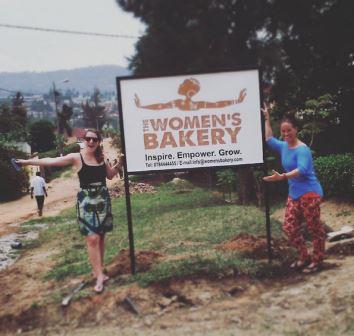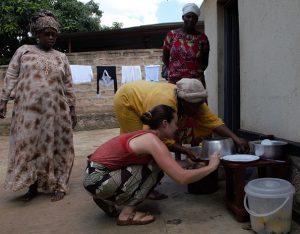The Women’s Bakery and Possibility-Driven Media in Rwanda


[The Women’s Bakery] Co-Founder of the Women’s Bakery, Julie Greene, demonstrates the baking process for bread to a group of women in Rwanda.
It’s been four years since my first visit to the country and I can’t help but think, “How in the world am I still fielding questions like these?”
Africa Misconceptions and Stereotypes
The reality of misconception about the country is both simple and also extraordinarily complicated.
It is understandable why an average news-reader might maintain qualms about the security presence in Rwanda, many years after it was devastated by genocide 21 years ago. The intensity of such a historical precedent creates wounds, memories, and consequences that run deep. More than that, the image of genocide tied to the country is commonplace. We see this in films, news reports, and on-the-ground sources fixate in 1994.
The American-made movie Hotel Rwanda continues to be a hot topic for conversation among Western audiences, and documentaries on the topic are released every year.
Yet, the allusion that the country is still war-ridden is practically quite untrue. The association can be complicated, too, because the change in the country over the last 21 years is quite evident.
Infrastructure, government initiatives, development projects, economic shifts, and reconciliation has been of major focus for country officials. There is an insular push to balance both memory and progress; a tension that will likely exist in the country for years to come – if not forever.
In 2014, James Musoni, the Minister of Local Government, launched the Rwanda Media Barometer to share perceptions of media stakeholders, civil society organizations, the general public, and media experts on the state of media in Rwanda. With media development given a rating of 61%, a major need for an increase in public and media interaction was indicated.
Even at this juncture, the media is still needing to further engage with the public audiences of Rwanda.
And so even with unprecedented levels of forgiveness and an impressive focus on the future viability of the country, imperfect it remains. History and culture can be messy, and Rwanda is no exception.
Rwandans Playing a Role in Development
But despite both palpable and complex cultural and media elements of Rwanda, one thing can be certain. For the positive stories – both unreported and reported – Rwandans continually, are the key players in the community, increasingly large-scale change, and development.
There is more to Rwanda than most articles, news outlets, and publications reveal. More than highly touted government initiatives, it is stories – layer on top of layer – that are proving that Rwandans are the ones changing and bringing possibility, innovation, and empowerment to their “land of a thousand hills.”
A good example of this is in the making of bread.
In the village corners of the Eastern Province, in the sleepy district of Nyagatare, the idea of bread as a social business was born in 2012. Markey Culver, a United States Peace Corps Volunteer living in a rural community, Bushoga, at the time, began to bake bread from scratch to supplement the typical Rwandan diet of plantains, beans, rice, and potatoes.
The variety of bread struck a chord with community members who were curious about Culver’s recipes and methods.
Started as an opportunity to educate, the idea of bread’s marketability and reach developed into a social enterprise. Soon, through a partnership by Culver and her Peace Corps colleague, Julie Greene, The Women’s Bakery had its’ inception, to promote education and business.
The Economics of Bread
Rwandans – especially women in the community – wanted to know about the bread, and they wanted to know how it could help their families – and their own economic opportunities. They studied, they learned, and they made it happen.
Founded as a business that strives for social good, with nutrition-infused, locally-sourced products, and access to women’s empowerment, the bakery continues to equip women with life skills, and nutrition training for many women in East Africa. Culver calls this “Conscious capitalism.”
The bakery is great news out of Rwanda. It promotes safety, security, and a healthy business climate. The bakery is an example that the dynamic of Rwanda has changed and is ever-changing; women are entering businesses, accessibility is actively pursued, and local market diversity is possible.
Meanwhile this fall, the bakery has plans for the organization’s first training with a group of women in the country’s capital, Kigali.
With increasing partnerships, the training, and the potential for new branches, this information is creating excitement all over the community. So too are the changes taking place all over Rwanda.
